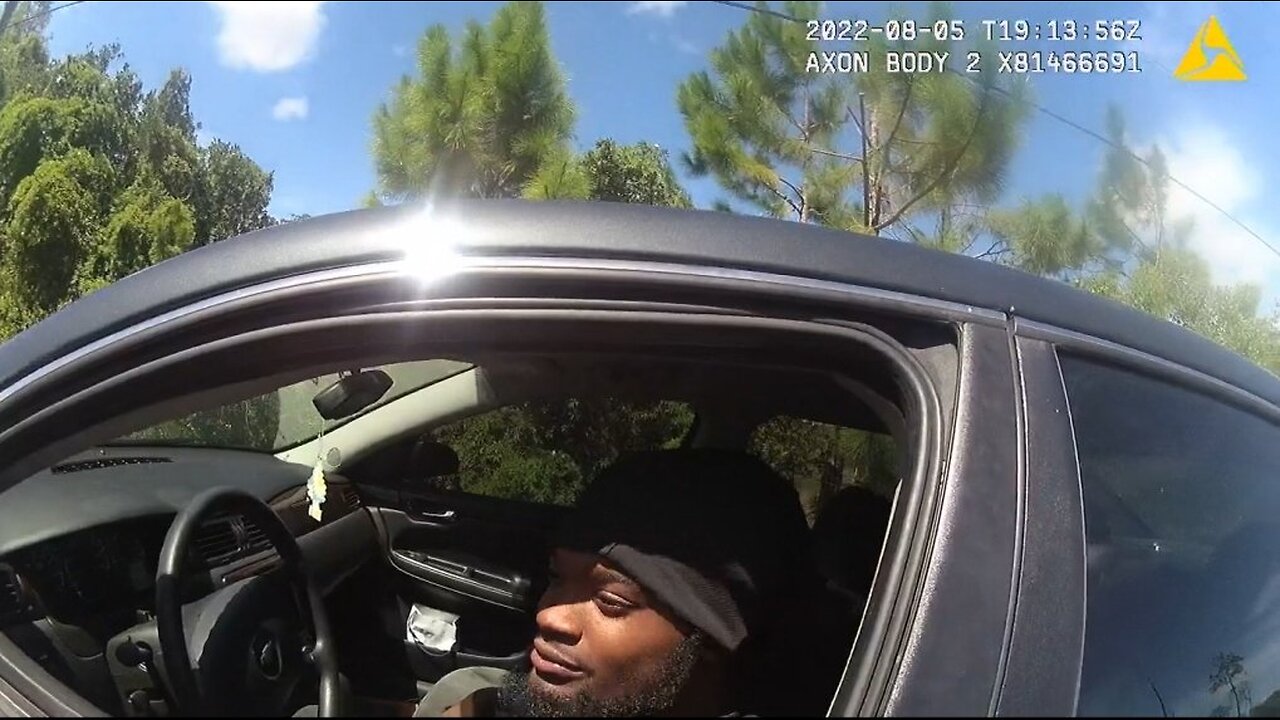Premium Only Content

Body cam shows Darius Jermaine Ned Thomas Jr. being ticketed for loud music under new Florida law
Black drivers in Florida are nearly three times more likely to be ticketed by police and sheriff’s deputies under a law that allowed law enforcement to cite drivers for loud music starting last year, according to a new analysis of traffic data and court records.
The analysis showed that Black drivers received almost 37% of the tickets, despite Black people making up only about 16% of Florida’s driving-eligible population. Law enforcement cited Black drivers at a rate of just over 11 tickets per 100,000 Black drivers, and cited white drivers at a rate of 3.9 tickets per 100,000 white drivers.
The investigation is the first broad review of enforcement of the law since it took effect nearly one year ago. It examined nearly 850 loud music tickets from May through December, obtained under Florida’s public records laws from the state’s Traffic Citation Accounting Transmission System.
The analysis was part of an investigative reporting project in the University of Florida College of Journalism and Communications. The law was passed by Florida’s GOP-controlled Legislature last year and signed by Gov. Ron DeSantis.
Carven Exantus, 34, of Miami has been ticketed five times for loud music – at $129 each – by police in Miami Beach, including twice the same day 90 minutes apart in October. Exantus, who is Black, beat four of the tickets in court, so far. His most recent ticket was the afternoon of March 9 along Ocean Drive. He has pleaded not guilty.
He urged police and the Legislature to suspend enforcing the law: “Stop being racists, simple. Something is disproportionately affecting one group, and it’s designed to be that way. If it’s walking and quacking like a duck, it’s a duck. It’s racist.”
Exantus was ticketed driving road-legal golf carts with license plates and headlights for his business, Crew Cart Services LLC of Miami. It offers tours, pick-ups and drop-offs for tourists and locals along the beach district. The carts, with stereos, are open-air with no doors and no windows.
“We’re getting harassed to the point where I can’t even conduct business,” Exantus said
His business partner, Fred Laurice Johnson, 33, has been ticketed four times in Miami Beach for loud music and contested all the $129 tickets. On Friday, he beat a ticket in court that accused him of playing Maroon 5 too loudly on Dec. 1. The judge dismissed it when the officer didn’t show up to testify. Johnson, who is Black, and Exantus said they have never seen police use a sound-measuring device before writing tickets for loud music.
“It’s up to the cop’s discretion,” Exantus said. “I’ve asked, ‘Can you show me and prove to me that we’re being too loud?’ Then they get really mad, and they’ll definitely give me two tickets after that.”
Rondrae Thomas Wright, 49, of Coral Springs, was cited in Fort Lauderdale on July 1 driving a Slingshot three-wheeled motorcycle along the oceanfront boulevard near Sebastian Street Beach. The police officer said he could hear Wright’s music even as Wright drove away from him. A judge dismissed the ticket after Wright, who is Black, fought it in traffic court two months later.
Wright said he felt targeted. “That was exactly what that was about,” he said in an interview. “I was like, damn, my radio is not even loud. I couldn’t believe he did that.” His wife, seated next to him in the cockpit that day, was in disbelief, researching the new music law using Google as the police officer wrote the ticket, he said.
“I was saying that from the beginning, that this law would target Blacks,” said Sim Oliver Crum Jr., 46, of Starke in north-central Florida. Crum, who is Black, was ticketed three times under the new law, twice in October by the Jacksonville Sheriff’s Office and in December by Gainesville police.
“I don’t like anything about that law, period,” Crum said. “You should be able to play your music if you want. What do they have to do to prove they can hear you play your music from 25 feet away?”
Police said the new law is helping to reduce noise where cars are driving with loud music. Officer Mike Vega, a spokesman for the Miami Police Department, said officers are pulling over egregious cases. The agency there issued 65 tickets over six months, including to 18 Black drivers, 27 to white drivers and 20 to drivers identified in license records as “other.”
“We now have the authority to go and say, ‘Hey, you need to lower your music,’” Vega said.
The analysis showed that white non-Hispanic drivers received about 46% of the tickets, with white non-Hispanic people making up 56% of the state’s driving-eligible population. Police officers and deputies issued the rest of the tickets for loud music to drivers identified as Hispanic, “other,” such as multiracial, or Native American.
Florida’s Republican-controlled House passed the bill allowing loud music tickets last year 83-32, largely along party lines. All but one of the 19 House Democrats who were Black voted against it. One Black Republican supported it. Eighty-one white lawmakers voted for it, including 76 Republicans.
The last stop in the Senate, the Rules Committee, approved its version of the bill 11-6, with three of the four Black lawmakers on the panel voting against it. The Senate deferred to the House version, which DeSantis signed on May 26. The new law took effect immediately.
The House bill’s sponsor, Rep. Tom Leek, R-Daytona Beach, said last year it was intended to crack down on so-called pop-up parties or meets – he called them “invasions” – that have been the subject of complaints by homeowners in neighborhoods where drivers gather and generate too much noise.
-
 LIVE
LIVE
The Rubin Report
18 hours agoFormer CEO: The Aftermath of Vice Media & What's Next for Mainstream Media | Shane Smith
1,559 watching -
 LIVE
LIVE
tacetmort3m
1 day ago🔴 LIVE - BECOMING THE UNTOUCHABLE (RADIATION WHO?) - STALKER 2 - PART 3
192 watching -
 16:05
16:05
China Uncensored
14 hours agoAnother Car-Ramming Strikes Outside a Chinese School!
1.95K5 -
 9:26
9:26
Dr. Nick Zyrowski
5 hours agoAnti Inflammatory Foods | You MUST Eat These!
296 -
 15:40
15:40
Bearing
55 minutes agoEnd Stage Trump Derangement | Rosie O'Donnell is NOT Doing Well 😬
628 -
 35:19
35:19
hickok45
3 hours agoSunday Shoot-a-Round # 256
7565 -
 41:20
41:20
PMG
15 hours ago $0.22 earned"The No B.S. Guide to Getting Your Life together in 2024!"
627 -
 14:22
14:22
Forrest Galante
15 hours agoDoes The Megalodon Still Exist?
83.7K26 -
 26:48
26:48
Stephen Gardner
10 hours ago🔥BREAKING: Vladimir Putin JUST shocked NATO | Will only negotiate with Trump!
130K260 -
 2:45:39
2:45:39
Tundra Tactical
13 hours ago $34.21 earnedTundra Nation Live : The Worlds Okayest Gun Live Stream
65.6K2